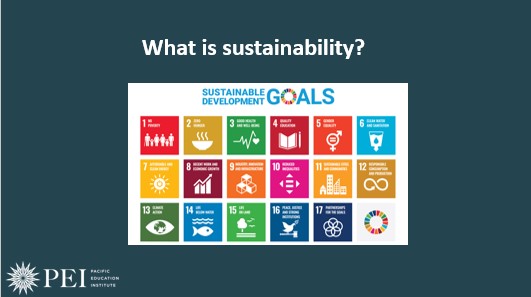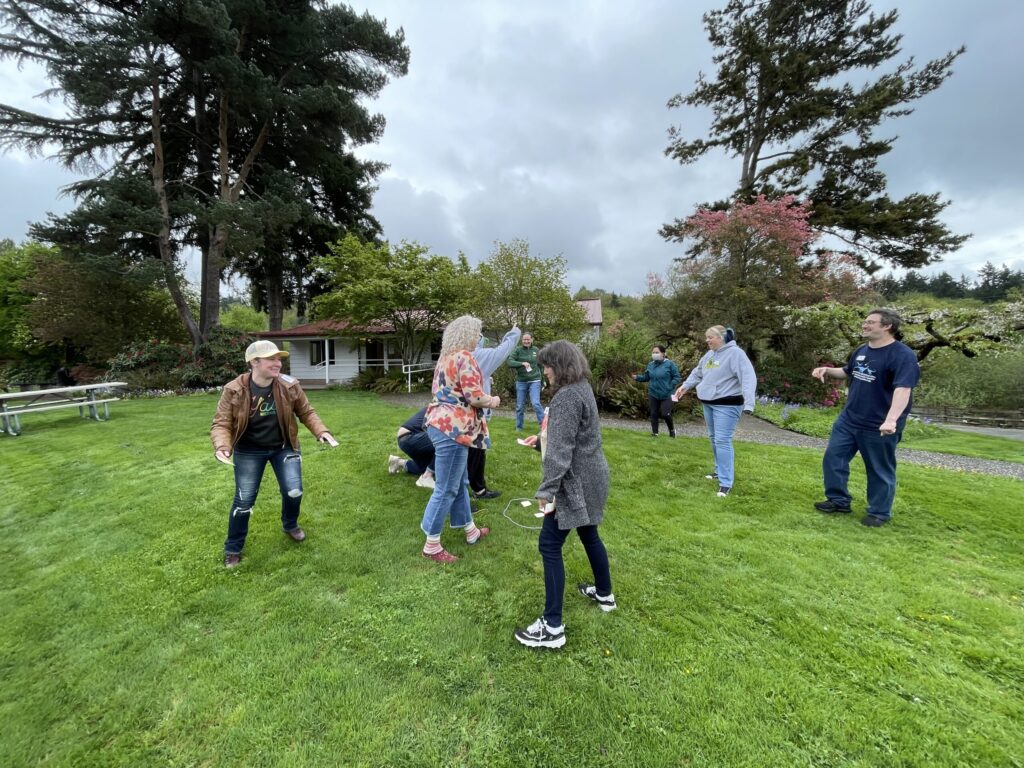Teachers playing ‘The Greenhouse Gas Game’ during the workshop. *Note: this photo is from a previous workshop in May 2023.
Given the choice between apathy and disengagement vs. passionate discourse and debate, any teacher worth their salt will choose the latter. As a former high school teacher, PEI’s Coastal FieldSTEM Coordinator John Hunter was happy to see how engaged participants in a recent Sustainability Course workshop became during a simulation game called ‘The Common Good’ in which students had to determine short-term strategies that would maximize resources for the whole group.
“It generated active discussion,” says Hunter. “There was a desire to clarify concepts. The game brought out a lot of issues and attitudes. It was the kind of discussion I would have been thrilled to have among my students when I was teaching high school.”
The ten-unit middle and high school course developed by five PEI staff members focuses on refining students’ critical and creative thinking around the complexities of climate change, sustainability, and United Nations Sustainability Development Goals (SDGs). The course includes a media literacy component that examines stories about climate change from multiple perspectives.
“There was a discussion around the limitations of perspective and how it can evolve as more information emerges. One table kept saying, ‘I just have more questions now.’ That was a breakthrough because we want students to leave this activity feeling like they have more questions. It felt like the teachers had really internalized that idea.” — Tressa Arbow, Education and Outreach Coordinator, NOAA Fisheries West Coast Region
Participants explored the units and experienced many of the activities they included. Guest speaker Tressa Arbow, Education and Outreach Coordinator at NOAA Fisheries West Coast Region, says that was intentional. “Teachers can look through curriculum and standards, but if there are activities included that they can’t quite get their heads around, they probably won’t do them,” says Arbow, who co-created the course while working for PEI. “We kept having them experience the activities so they would feel comfortable implementing them.”
During the media literacy component, groups of teachers looked at a section of one photo and had to guess what was happening based on the information they had. Then the whole class shared their ideas. At that point, it became apparent that they all had different parts of a larger photo and none of them could see the whole picture.

“There is this moment of, ‘That is not at all what I thought was happening in my photo,’” Arbow explains. “There was a discussion around the limitations of perspective and how it can evolve as more information emerges. One table kept saying, ‘I just have more questions now.’ That was a breakthrough because we want students to leave this activity feeling like they have more questions. It felt like they had really internalized that idea.”
All were from formal or alternative schools within the Port Townsend School District. While the course is designed for middle and high school students, one-third of the attendees were elementary school teachers. They considered ways they could adapt activities to make them developmentally appropriate for their students.
One high school teacher also got creative with a greenhouse gas activity, thinking about ways to incorporate specific gases based on where they live and how many there are. “He said, ‘One of my students could be methane and others could be CO2; we could play this out to demonstrate that methane molecules trap more heat, but we don’t have any in the atmosphere, whereas CO2 doesn’t trap as much but there is more of it,’” Arbow says. “It was cool to see this range of grade level teachers who all had exciting ways they could use what they were learning.”
The Sustainability Course workshop was funded through a grant from the Susan and Eric Carlson Foundation.
